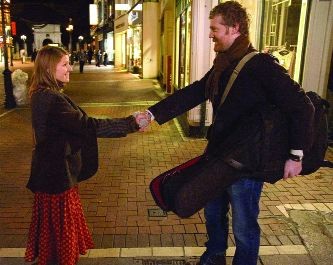A guy, a girl, a guitar

Glen Hansard, lead singer for the Irish band The Frames, has a long, woebegone face pebbled with a rust-colored beard; his eyes are immense, with the peeled look of billiard balls. He suggests a gangly Gaelic version of the young John Lithgow. The character Hansard plays in the enchanting film Once, identified in the credits simply as The Guy, is a Dublin busker who holds down a day job at his dad’s vacuum cleaner repair shop.
The Guy plays his guitar and sings downtown during work breaks, entertaining passersby with popular standards. At night he’s usually entertaining himself, performing his own compositions—poignant ballads of romantic masochism delivered in a startlingly impassioned style that quavers into an expressive falsetto in the most intimate sections. It’s during one of these twilight interludes that he meets The Girl (Markéta Irglová), who hears one of his songs and understands immediately that it was written for an ex-lover he hasn’t gotten over.
The Girl is a Czech émigré with a thoughtful pixie face who lives with her mother and a young daughter. She sells roses on the street and occasionally lands work as a house cleaner.
She’s also a musician: her father taught her how to play piano, but she can’t afford one of her own. A congenial music-store owner lets her come by and play one of his models. When she and The Guy become friends, she takes him by the store and they play a duet, harmonizing on the vocals. They sound so heavenly together that you’re sure they belong together, not just as musicians but as a couple, like Joaquin Phoenix’s Johnny Cash and Reese Witherspoon’s June Carter in Walk the Line.
Written and directed by The Frames’ one-time bassist John Carney, Once is a small-scale, lyrical movie that seems to take its rhythms from Hansard’s songs. The poetic rightness of Hansard and Irglová as a couple is linked to the sweet (and unconventional) sounds they make together, much they way Astaire and Rogers were defined as a couple by their inspired compatibility as dance partners. The two comprehend music in the same way.
In one scene, The Guy persuades The Girl to let him hear one of her songs, and after some protest she performs a love song with so much feeling that she breaks down in tears. When he asks if she wrote it for the husband she left behind in the Czech Republic, the father of her little girl, she says yes and adds, “He didn’t like it. He’s an idiot.” She doesn’t have to explain to The Guy or to us that any man who can’t appreciate the beauty of that song is an idiot. The Guy looks dazed, as if he’s been sprinkled with fairy dust.
The film’s title, besides implying the beginning of an unlikely romance (as in “once upon a time”), alludes to the past of each character, which cannot be tossed aside. The Girl doesn’t want her daughter to grow up fatherless; she urges her husband to join her in Dublin so they can try to work things out. The Guy can’t get his old girlfriend out of his head; she’s the ghost who haunts the songs he keeps writing.
The movie isn’t so much about the reality of a love relationship as about the potential for one. In that way it’s reminiscent of the great American romantic film Before Sunrise. The Guy and The Girl record together; she turns out to be pragmatic and tough-minded. And the session is a triumph. But their personal connection has a far less definite scenario. Once doesn’t have the comforting shape of a romantic comedy, which may be why it leaves you feeling sublimely unmoored.





